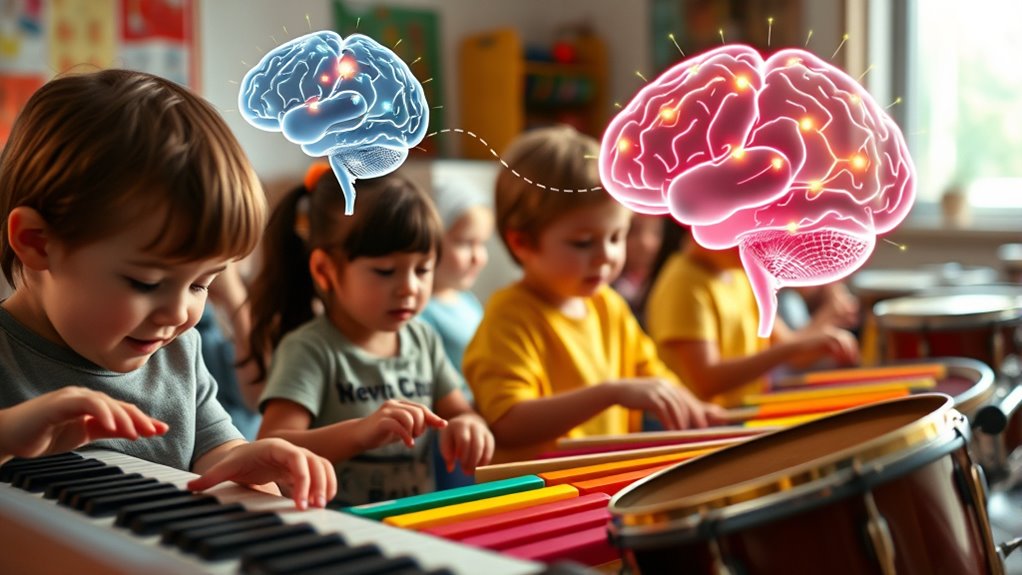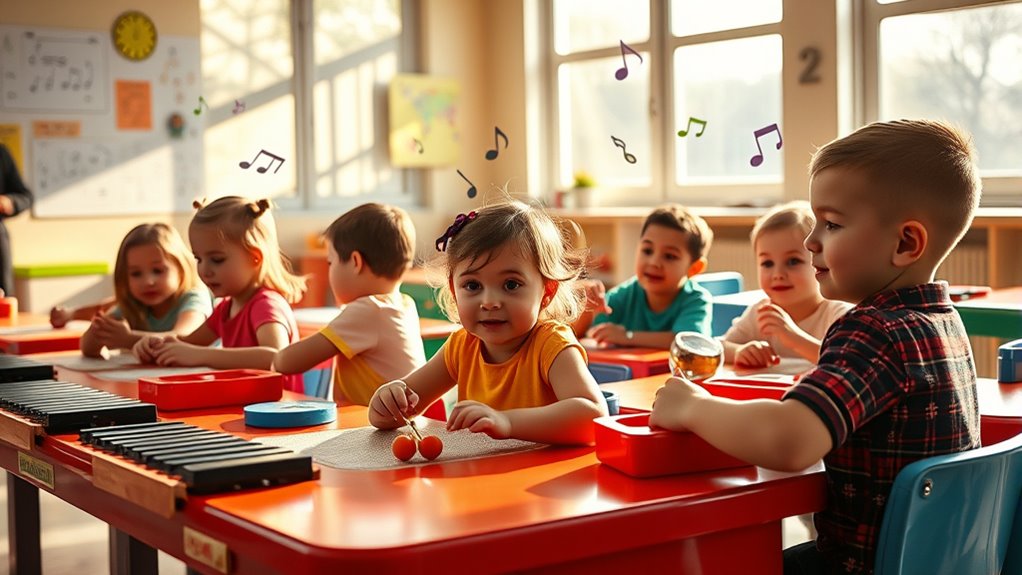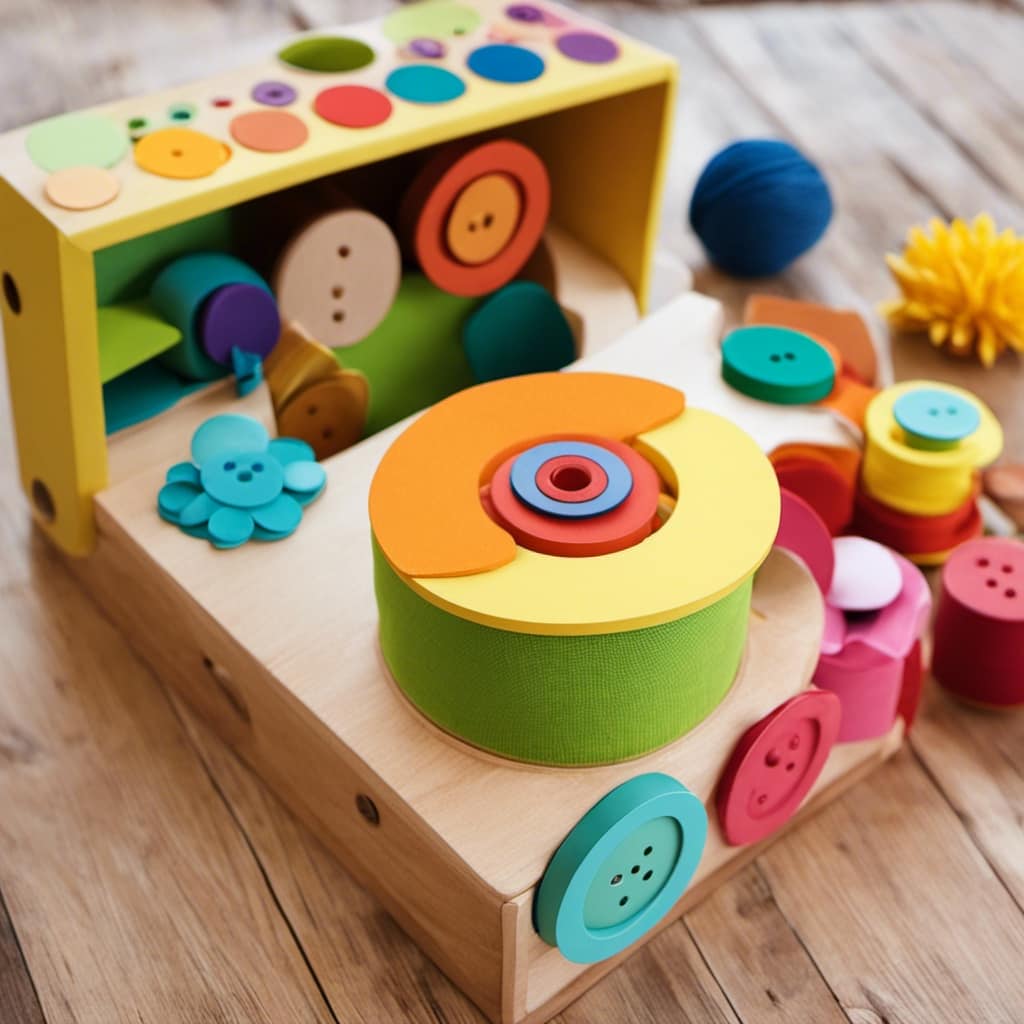Engaging in music-making during childhood rewires your young brain by strengthening neural connections involved in both auditory and motor skills, which also support mathematical understanding. Playing instruments or singing stimulates multi-sensory engagement, boosting brain efficiency and promoting cross-modal neural networks linked to math reasoning. This mental workout cultivates focus, problem-solving, and confidence, laying a strong foundation for lifelong success in math and beyond. Continuing to explore this connection will reveal even more ways music shapes young minds.
Key Takeaways
- Musical training enhances neural connections that support logical thinking, problem-solving, and pattern recognition, benefiting math skills.
- Playing instruments stimulates multi-sensory brain regions, improving analysis, visualization, and mental calculation abilities relevant to math.
- Music practice develops focus, memory, and discipline, which are critical for understanding complex mathematical concepts.
- Neural pathways strengthened by music extend to areas involved in mathematical reasoning, increasing processing efficiency and reducing math anxiety.
- Long-term musical engagement builds a neural foundation for lifelong problem-solving and academic success across STEM fields.

Playing music from a young age can considerably boost a child’s ability to succeed in math. When you introduce music-making early, you’re engaging the brain in ways that strengthen neural connectivity, which is essential for complex cognitive processes. This increased neural wiring enhances not only musical skills but also improves your child’s capacity for logical thinking, problem-solving, and pattern recognition—all key components of math success. As they practice reading rhythms, melodies, and harmonies, their brains develop more efficient pathways that transfer to numerical understanding and computational skills.
Early musical training boosts neural connections, enhancing children’s math skills and cognitive development.
By actively participating in music, your child experiences cognitive enhancement that goes beyond the musical domain. Playing an instrument or singing requires precise coordination between various brain regions, including those responsible for auditory processing, motor control, and spatial reasoning. This multi-sensory engagement stimulates neural growth, which in turn fosters stronger connections across different cognitive domains. Consequently, your child’s ability to analyze math problems, visualize solutions, and carry out mental calculations improves because their brain is wired for heightened connectivity and faster information processing.
Moreover, music-making encourages focus, discipline, and memory—traits that directly benefit mathematical learning. When your child memorizes pieces, follows rhythmic patterns, or learns new compositions, they develop working memory and attention skills. These are essential for understanding multi-step math problems and retaining mathematical concepts over time. The positive reinforcement that comes from mastering a musical piece also boosts confidence, motivating your child to approach math challenges with a more resilient mindset.
Research shows that the neural networks strengthened through musical training aren’t isolated to auditory or motor regions; they extend into areas associated with mathematical reasoning. This cross-modal neural reinforcement means that your child’s brain becomes more adaptable, capable of switching between different types of cognitive tasks with greater ease. As a result, they often find math more intuitive and less intimidating because their brain processes numerical information more efficiently.
Additionally, engaging in music can help develop neural connectivity, which is crucial for integrating information across different brain regions involved in math. In essence, by fostering musical activity in your child’s early development, you’re setting the stage for cognitive enhancement that makes learning math more natural and engaging. The neural connectivity cultivated through music not only supports academic achievement but also builds a foundation for lifelong problem-solving skills. Your investment in their musical journey helps shape a brain that’s wired for success in math and beyond, equipping them with the cognitive tools necessary for academic and personal growth.
Frequently Asked Questions
Does Playing a Specific Instrument Influence Math Skills More Than Others?
You might wonder if playing a specific instrument boosts math skills more than others. Instrument specificity can influence skill transfer, as some instruments require more complex coordination and pattern recognition. For instance, piano playing often enhances spatial-temporal skills, benefiting math. While all instruments foster cognitive development, choosing one with high skill transfer potential could give you an edge in math success. Your focus on the instrument matters in maximizing this benefit.
How Early Should Children Start Learning Music for Cognitive Benefits?
Research shows children as young as six months can benefit from music therapy, enhancing cognitive development. You should start teaching your child music as early as possible, ideally during preschool years, to maximize these benefits. Early exposure to musical improvisation helps develop problem-solving skills and creativity, which are linked to better math performance. The sooner you introduce music, the more you help your child’s brain form strong neural connections for lifelong learning.
Are There Differences in Brain Rewiring Between Individual and Group Music Activities?
In group music activities, your brain benefits from dynamic group interactions and shared rhythms, enhancing social skills and collaborative thinking. Conversely, individual focus in music practice deepens concentration and fine motor skills. Both approaches rewire your brain differently—group dynamics boost social cognition, while solo work strengthens neural pathways related to precision. Combining both methods maximizes cognitive growth, allowing your brain to develop versatile skills that support math success and overall learning.
Can Digital Music Tools Replicate the Benefits of Traditional Music-Making?
Digital sound and virtual instruments can replicate many benefits of traditional music-making, but they may not fully match the brain rewiring advantages. You can engage in creative music experiences with these tools, boosting your spatial and mathematical skills. However, hands-on, physical instruments often foster deeper neural connections through tactile learning. So, while digital tools are accessible and versatile, combining them with traditional methods offers the best chance to maximize brain benefits.
How Long Does It Take to See Math Improvements From Music Training?
Time is of the essence when it comes to seeing math improvements from music training. Usually, within a few months, you’ll notice better problem-solving skills and stronger neural plasticity. The key is consistent practice, as skill transfer from music to math depends on how well your brain rewires itself. Stick with it, and you’ll find the benefits grow over time, proving that patience pays off in brain training.
Conclusion
As you see, engaging in music-making can boost your brain’s math skills. Studies show that kids involved in music outperform their peers in math tests by up to 34%. When you pick up an instrument or sing, you’re rewiring neural pathways that make solving equations easier. So, if you want to succeed in math, don’t just focus on numbers—embrace music. It’s a powerful way to train your brain for success.










